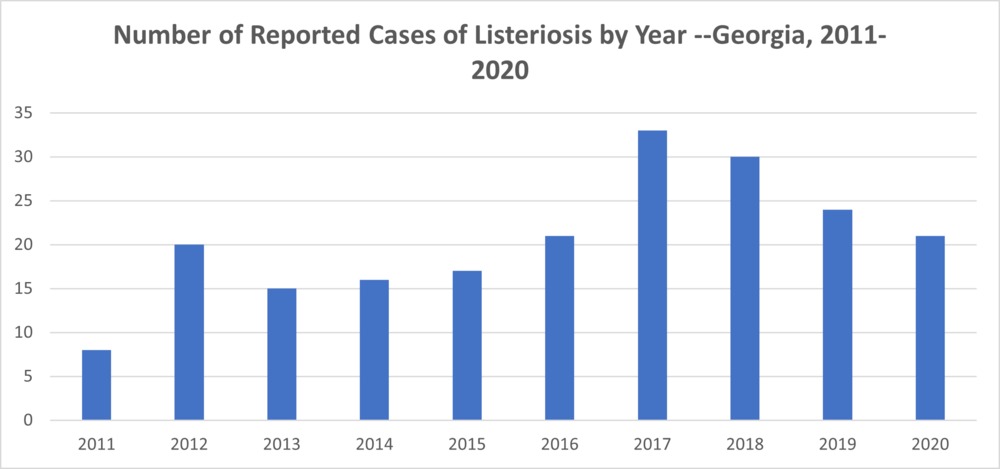
Listeria
Listeriosis is a serious infection caused by eating food contaminated with the bacterium Listeria monocytogenes. Most people do not get listeriosis, even when exposed to the bacteria, but persons with certain health conditions can become ill. According to the Centers for Disease Control and Prevention, an estimated 2500 persons become seriously ill with listeriosis in the United States each year. Of these, approximately 500 die. Listeriosis is the third leading cause of death from foodborne illness.
Listeria Basics:
Listeriosis is a serious infection caused by the bacterium Listeria monocytogenes. Healthy adults and children occasionally get listeriosis, but they rarely become seriously ill. Persons at greatest risk for serious illness are pregnant women, newborns, elderly and those with weakened immune systems. Symptoms may include fever, headache, tiredness, aches and pains. Sometimes infected persons have diarrhea, nausea and stomach cramps, but this is less common. The illness may progress to a more serious form, such as meningitis (brain infection) and septicemia (blood poisoning).
Animals can carry Listeria monocytogenes in their intestines and may not become sick. As a result, the bacteria may be spread through meat and dairy products. Humans can get listeriosis when they eat food contaminated with Listeria monocytogenes. When mothers eat contaminated food during the first or second trimester of pregnancy, Listeria infection may lead to miscarriage and stillbirth. Maternal infection during the third trimester of pregnancy can lead to premature delivery and/or listeriosis in the baby following birth.
There are several ways to prevent listeriosis:
1. Cook thoroughly raw food from animal sources such as beef, pork, or poultry.
2. Wash raw vegetables thoroughly before eating.
3. Keep uncooked meats separate from vegetables and from cooked food and ready-to-eat foods.
4. Avoid raw (unpasteurized) milk or foods made from raw milk.
5. Wash hands, knives, and cutting boards after each handling of uncooked foods.
Persons at high risk for infection, including pregnant women and persons with weakened immune systems, should observe the following additional recommendations:
1. Avoid soft cheeses such as feta, Brie, Camembert, blue-veined, and Mexican-style cheese.
2. Cook left-over foods or ready-to-eat foods (e.g., hot dogs) until steaming hot.
3. Although the risk of listeriosis associated with foods from deli counters is relatively low, pregnant women and immunosuppressed persons may choose to avoid these foods or thoroughly reheat cold cuts before eating.
When infection occurs during pregnancy, prompt administration of antibiotics can often prevent infection of the fetus or newborn. Babies with listeriosis receive the same antibiotics as adults, although a combination of antibiotics is often used until physicians are certain of the diagnosis. Even with prompt treatment, some infections result in death. This is particularly likely in the elderly and in persons with other serious medical problems.
For Healthcare Professionals
Listeria can be identified by culture and culture-independent diagnostic methods. The Centers for Disease Control and Previous provides a framework for assessing medical treatment for those ill with listeriosis.
https://www.cdc.gov/listeria/hcp/clinical-care/
Reporting and Surveillance
Listeriosis is a notifiable disease in Georgia. All laboratory positive results of Listeria monocytogenes are reported to the Georgia Department of Public Health. When DPH receives a report of listeriosis, a DPH staff member will conduct an interview with the patient or next of kin about the foods they ate within the month before they got sick. This information helps public health identify a possible common source, which can help prevent or solve an outbreak.
Listeria Statistics
In Georgia, Listeriosis is rare.

Page updated 12/30/2022